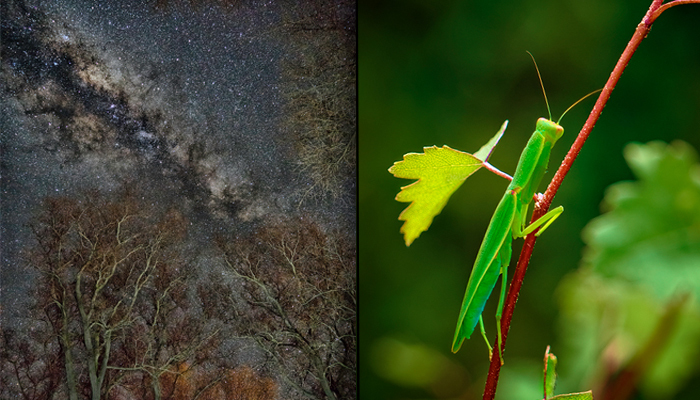Simply Central: The science of awesome
Mary Hinsen
18 September 2021, 5:44 PM
 Research has cast new light on one of the most profound human experiences - awe.
Research has cast new light on one of the most profound human experiences - awe. Being awestruck can bring a host of benefits from lowering stress and boosting creativity to making us nicer people - but what exactly is awe, and how do we get more of it in our lives?
Simply Central is a home and lifestyle series for your Sundays. We take a look at what’s hot, what’s not, and everything lifestyle.
We all know that amazing sensation of feeling part of something much larger than ourselves, of being upended by the vastness of the night sky, fit to burst with the emotion and wonder of a new birth, or consumed with the intensity of great music.
Research has shown that experiencing these magical feelings also changes how we approach our lives. Experiencing awe can make us more satisfied, less self-involved, less likely to feel starved for time, more grateful and more likely to help others.
Scientists have learned these ‘Wow!’ moments also stimulate curiosity, creativity and innovation - all critical tools for solving complex social problems. Most importantly, they bring joy.
The best thing? It’s easier than you think to feel awe every day.
Awe brings with it a host of physiological, psychological, and social effects. Studies have found that feelings of awe can be accompanied by heart rate changes, goosebumps, and the sensation of chills, and there is some evidence that awe may even decrease markers of chronic inflammation.
When it comes to psychological effects, studies have found that awe can give people the sense they have more available time, increase feelings of connectedness, stimulate critical thinking, create positive mood, and decrease materialism.
Multiple studies have found evidence that experiencing awe also makes people more kind and generous.
For example, people who wrote about a time when they experienced awe were more willing to volunteer their time to help a charity than people who simply recalled a happy experience.
Another study found that people who stood among awe-inspiring eucalyptus trees picked up more pens for an experimenter who had “accidentally” dropped them than did people who stared up at a not-so-inspiring large building.

Our own natural environment is full of awesomeness.
In their 2003 research paper, US psychology professors Dacher Keltner and Jonathon Haidt described two aspects of awe experiences: ‘perceived vastness’ and a ‘need for accommodation’.
Perceived vastness, they say, can come from observing something physically large, the vast night skies for example, or from simply being in the presence of someone with immense prestige like a famous sports star. It could also be the incomprehensible small scale of atomic particles.
This perception of vastness upends our existing understanding of the world, it exposes us to things we don’t yet understand, and our brains work to make sense of it.
An awe experience provokes a need for ‘accommodation’ when it defies our expectations.
When we experience something that challenges what we thought we knew, our knowledge has to restructure itself in order to accommodate it. Fittingly, this process of learning is known as ‘accommodation,’ and it’s an essential part of gaining new perspectives.
Since the 2003 study, other researchers have confirmed that experiencing awe helps us to focus less on ourselves and feel more like part of a larger whole.
In multiple studies, awe-struck research subjects have shown greater generosity, more ethical decision-making, kinder behaviour towards others, and a decreased sense of entitlement.
Vicki Zakrzewski, education director at UC Berkeley has studied the effects of awe in her students. She found that by helping young people connect to something larger, awe could also open their minds to new ways of thinking and help them discover a deeper purpose in life.
In their original research paper, Keltner and Haidt stated that “awe-inducing events may be one of the fastest and most powerful methods of personal change and growth.”
So, if experiencing awe can inspire so much in us, what inspires awe?
Beauty – a dazzling sunset rich with colour, music with its mesmerising harmonies, dissonances and textures, plants from the most delicate of our ferns to the splendour of our 100-year-old kowhai in flower.
Exceptional ability – the precision of athletes, a tool someone has invented to solve a problem, the amazing landscapes painted by our local artists, the intricate colour-work and detail in a skilfully hand-crafted garment.
Powerful forces – the immense energy of the lightning experienced earlier this week, the powerful current of the mighty Mata-Au, the immense g-forces experienced by drivers in race car crashes.
Infinity and infinite repetition – the uncountable number of stars in the night sky, evolution and amazing adaptations of some of our native species. The secret code of Fibonacci numbers are often found in nature, such as the number of spirals in a pinecone or petals on a flower.
Breadth and scope – truly seeing the ‘big picture’ for the first time can forever alter how you feel in the now.
Look at things around you with awe in mind, and it may just help you gain a better perspective for life.
Image credits: Mary Hinsen
